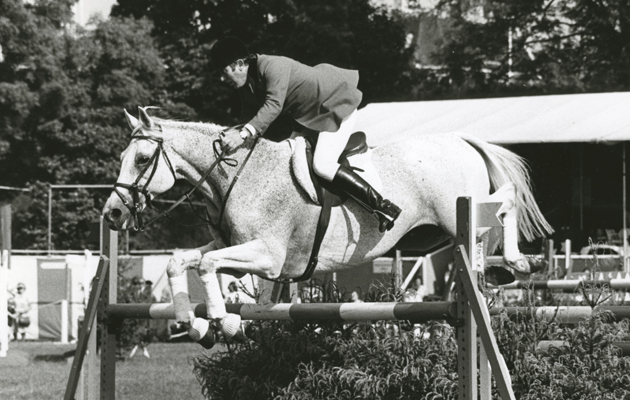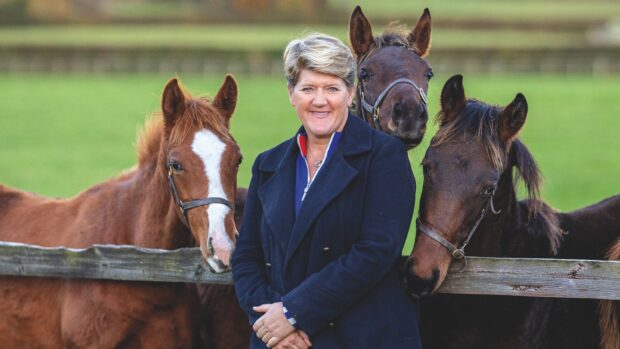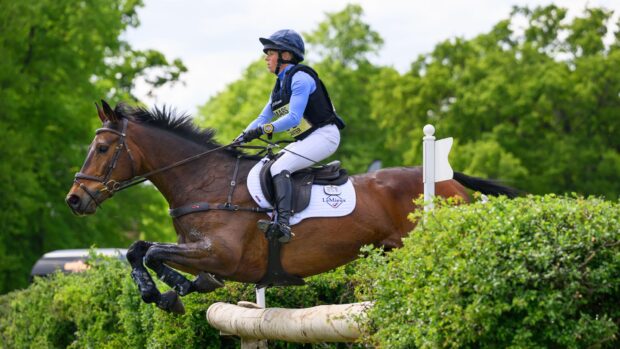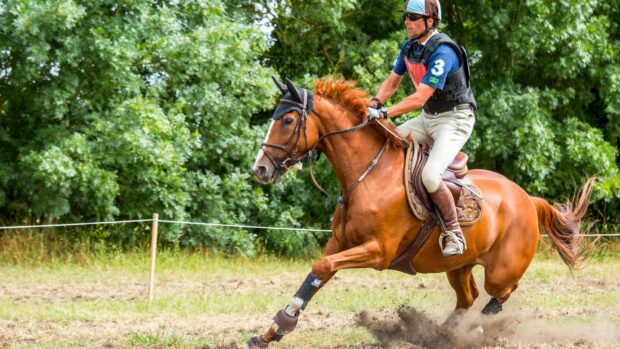BBC Radio 4’s programme Desert Island Discs is something of a national treasure, where ‘castaways’ are asked which eight records they would take with them to a desert island.
The brainchild of broadcaster Roy Plomley, the first programme was broadcast on 29 January 1942 — and during the past 78 years it has given us an addictive insight into the lives of a number of horsemen and horse-lovers.
What inspires them? What gives them their drive? What makes them laugh? And how have horses helped them during their lives?
Here’s our pick of the equestrian Desert Island Discs since the show’s inception…
Mark Johnston, recrod-breaking Flat trainer, on getting into trouble for riding
Broadcast in 2020
“Dad bought my sister a pony when we were younger, but I didn’t get one and I think that was probably a sexism thing in that he thought girls should be more into ponies than boys. I wasn’t allowed to ride my sister’s pony, so I used to climb through a window with a bridle — the window was too small to get the saddle through — and take the pony for a ride. All hell broke loose if I got caught, but that’s how I learnt to ride.”
Jilly Cooper, author of equestrian ‘bonkbusters’, on her first pony Rufus
Broadcast in 2016
“Daddy went to get him from Cornwall and so I came back from school terribly excited — I must have been about eight — and I rushed into the field and said ‘Rufus, Rufus’ and he promptly bit me. He was a monster. He was also still a stallion and so every time I went out for a walk with him he would rush up to a mare and mount it. So sadly Rufus was sold…”
Comedian Lee Mack on his foray into the world of racing
Broadcast in 2013
“I was thrown out of college at 16 because I’d failed all my O-Levels and I went home thinking, what am I going to do with the rest of my life? I put the telly on and horseracing was on. I’d had a mild interest in racing because my granddad had liked to bet and I used to watch the Grand National, but that was it. I’d never had any horse experience in my life. But by coincidence in my home town they trained Red Rum. So I thought, I’ll do that then. So having turned the telly on to phoning up the stables it was probably about 60 seconds. And the first horse I ever rode was Red Rum. He was retired and my mate who was working at the yard said ‘right, it’s about time you sat on a horse,’ and so I jumped on a horse. And he said: ‘You know who that is don’t you?’ They all looked the same to me but he said: “That’s Red Rum’.”
Broadcaster Clare Balding on showing off her Shetland to The Queen
Broadcast in 2013
“My father trained racehorses for The Queen for his whole career, and my grandfather had done and my brother does now, and the Queen Mother had horses with us too. And as owners want to do, they wanted to see the horses and talk to the people who look after them. Everything would be spotless, and the horses would be gleaming and they would be all ready for morning gallops or evening stables. And [when The Queen came] I used to go and get the Shetland pony Valkyrie that we used to ride, that had been a present from The Queen, and bring her down from her yard to line up with the racehorses for The Queen to look at.”
Jockey Frankie Dettori on the day in September 1996 when he rode all seven winners at Ascot
Broadcast in 2006
“That day the Queen Elizabeth Stakes was the big race and basically I was focusing on trying to win that, and I knew I had another couple of chances on the card. But never in a million years did I think I was going to win the seventh race. I was actually so relaxed about it, I was joking about it — I could not see the horse winning. Crossing the line with Fujiyama Crest I remember being exhausted, because of the mental pressure of a day like that. By the time I’d won the seventh, I didn’t even remember the first three.”
Three-time champion jump jockey Ricard Dunwoody on one of his first ever rides on a donkey called Seamus
Broadcast in 1999
“My father put me on a donkey one day and we were walking through some fields. He went to shut a gate and let me go and the donkey bolted — I hung on for sa long as I could, but eventually fell off. My father came up to me, expecting me to be in floods of tears, but I had a big smile on my face and got up and said ‘daddy, I fall off like a jockey’, and I think I’ve been doing it ever since!”
Fifteen time National Hunt champion trainer Martin Pipe on his late start to riding
Broadcast in 1999
“I was very mollycoddled as a child — I wasn’t even allowed to ride a bike to school and I wasn’t allowed to ride a horse. The first time I got on a horse, I was 17 and was put on a racehorse, with no clue what I was meant to be doing — I used to fall off every day.”
Former jockey and best-selling author Dick Francis on hand delivering his work to royalty
Broadcast in 1998
“I hand deliver each new novel I have written to the Queen Mother each year. I have it ready in time for when we go to Royal Ascot, and my wife Mary and I are invited up to the royal box so that I can hand over the new copy. The next time I see the Queen Mother she remarks about it, so I know she has read it.”
The late racing commentator Peter O’Sullevan on the pressure of the Grand National
Broadcast in 1997
“The Grand National isn’t necessarily the hardest race to commentate on, but it’s the most fraught. It’s the one that one is most anxious about. [After the first one I ever did back in 1947 when there were 57 runners, and I just had a basic pair of binoculars], I promised myself, and it’s a promise I broke, that if I got through the next year’s National I wouldn’t subject myself to this ordeal again. I found it so devastatingly inhibiting and frightening, that one could get it wrong, and that it would be the most appalling thing to misinterpret the race.”
Former top National Hunt trainer Jenny Pitman on riding as a child
Broadcast in 1995
“People would send us ponies to break, handle or ride when we were growing up. Occasionally dad would be driving along and see a camp of travellers on the side of the road and he’d stop and do a deal with them, buy a pony and we’d take it home.”
Jockey and eight-time National Hunt champion Peter Scudamore on his mother’s will for him to have an alternative career
Broadcast in 1994
“If my mother had had her way, I would have ended up as an estate agent. Even when I was going well as a jockey, if I went round for Sunday lunch with her, she’d still ask when I was going to get a proper job. She wanted me to be an estate agent so much that she used to feed me plenty so that I would be too heavy to be a jockey, but by the time I was a teenager, I’d cottoned on to what was happening.”
Eventer Ginny Elliot on how riding helped her overcome an eating disorder
Broadcast 1986
“When I was at boarding school I went on a diet and just didn’t stop. I used to put bricks in my pocket when I was weighed and take doggy bags into school meals and drop the food in them. I did everything not to eat anything. It wasn’t until my mother came back on leave that she discovered what had happened because I’d obviously got very thin, but with the school uniform it was difficult to actually notice. And she took me home and she said either you eat or you don’t ride, and it was the fact that I wanted to ride that made me eat again.”
Like this? You might also enjoy reading these:
Subscribe to Horse & Hound magazine today – and enjoy unlimited website access all year round
Former showjumper David Broome (pictured, top) on how he started out in the sport
Broadcast 1981
“I remember going to my first hunter trials when I was about nine — and my one memory of that was that the following day, the local daily rag showed a picture of a Mr D Broome riding Coffee, but unfortunately the caption carried on to say that on landing he departed from his pony. And I’ve never been allowed to forget that.”
Continued below…
Like this? You might also enjoy reading these:

Subscribe to Horse & Hound magazine today – and enjoy unlimited website access all year round
Showjumper Harvey Smith on never having had a riding lesson
Broadcast in 1971
“A riding lesson is one thing I’ve never done. With riding lessons you would have been riding somebody else’s style, whereas when you’re self-taught you’re riding your own style. You’ve got to work together with the horse, to get both your minds together. I’d say it’s 60-70% the rider and 30-40% the horse. But a good horse will make up for a lot.”
All of the episodes above can be downloaded from the BBC’s Desert Island Discs archive. Visit www.bbc.co.uk
Horse & Hound magazine, out every Thursday, is packed with all the latest news and reports, as well as interviews, specials, nostalgia, vet and training advice. Find how you can enjoy the magazine delivered to your door every week, plus options to upgrade to access our H&H Plus online service which brings you breaking news as it happens as well as other benefits.




